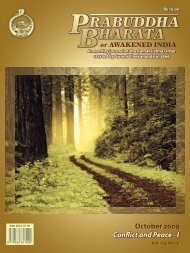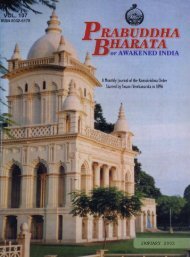October 2011 - Advaita Ashrama
October 2011 - Advaita Ashrama
October 2011 - Advaita Ashrama
Create successful ePaper yourself
Turn your PDF publications into a flip-book with our unique Google optimized e-Paper software.
24<br />
Prayer is a means to withdraw the mind from<br />
the world and gather it inwardly; then this inwardness<br />
is turned to God. Prayer allows us to<br />
establish connection with the ever-generous,<br />
ever-ready, ever-willing God. Prayer is a switch<br />
at our end that we can turn on—the switch at<br />
God’s end is always on. He is always willing to<br />
give; it is we who are closed. Silent prayer allows<br />
us to open, to listen to God; it is a rendezvous<br />
with God, though we may not always be conscious<br />
of it.<br />
Who should we pray to? Strangely enough,<br />
it does not matter who we pray to. This is because<br />
prayer is a practice of indrawal, and is a<br />
change of attitude at our end towards an unknown<br />
God. It is the opening of the door to<br />
the Lord, who is already at the door. The word<br />
‘whom’ cannot be applied to God, already at<br />
the door. But pray we must. The particular deity<br />
our spontaneous yearning takes to is the Ishta<br />
Devata, Chosen Deity. One, therefore, can pray<br />
to one’s Ishta Devata. Scriptures and saints tell<br />
us that the name of God is verily God, and thus<br />
the utterance of the name is a very powerful<br />
and fruitful form of sadhana. Hence, the importance<br />
of chanting God’s name or singing God’s<br />
glories. This too is prayer. Alternatively, we may<br />
repeat the mantra.<br />
The second practice for developing bhakti<br />
is surrender. It is a particular inner attitude to<br />
everything that is external, the joyful acceptance<br />
that everything happens as per divine will.<br />
It is based on the faith that God’s invisible hand<br />
is far more powerful and effective in bringing<br />
about the redemption we are seeking than our<br />
own efforts. In practice it means not to regret<br />
any occurrence, whether caused by oneself or<br />
by external circumstances, but to allow events<br />
and their effects to follow their natural course.<br />
All this is to be done without anxiety, without<br />
defending, without reacting to the external odds<br />
628<br />
Prabuddha Bharata<br />
our ego is wont to do. The ego is like a child<br />
afraid of its own mother’s hand, or like a man<br />
afraid of his own body. The ego cannot understand<br />
that the raison d’être of nature is the salvation<br />
of the self, purushasya kaivalya rtham7.<br />
‘Every star shines and every leaf moves for your<br />
salvation,’ says the poet. Rivers pour tons of<br />
water into the oceans, mighty stars collapse,<br />
storms rage—all for you. Surrender is the faith<br />
that in every event is hidden the mystery of one’s<br />
own salvation. In the apparently chaotic and accidental<br />
turn of events lies the secret of our redemption,<br />
our mukti.<br />
Prakriti, nature, toils to augment our spiritual<br />
self and is constantly effectuating an inner<br />
transformation to lead us towards God, to break<br />
us out of our limited existence into infinite expansion,<br />
provided we permit it by not asserting<br />
our little ego, by seeing God’s hand in it. We<br />
must give up the habit of inner resistance and<br />
judgement—both of which are reactions of the<br />
ego—in relation to things, events, or persons.<br />
Withholding judgement brings about the inner<br />
chemistry that frees thinking. We have been enjoined<br />
to cultivate the trust and faith a child<br />
bears towards its mother. We must abandon<br />
everything to the divine Providence.<br />
But the divine plan is a mystery. The benefit<br />
of God’s grace comes through His releasing<br />
our consciousness from bondage. This may happen,<br />
more often than not, through misery, affliction,<br />
or mishap.8 If the adverse, the untoward<br />
has taken place in life, it too is God’s grace and<br />
we must accept it as such.9 God also uses sorrow<br />
and pain—or, for that matter, pleasure as<br />
well—for our ultimate good. At the same time,<br />
we should be careful not to go to the extent of<br />
deliberately inviting misery. Self-inflicted pain,<br />
for example to exhaust our karma, is an egotistic<br />
action and is therefore against God’s will.10 Any<br />
ego-dictated action is against God’s will.<br />
PB <strong>October</strong> <strong>2011</strong>

















